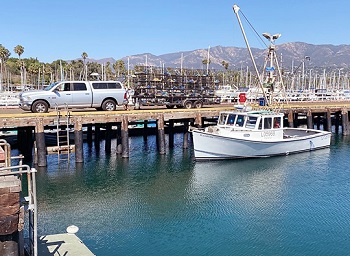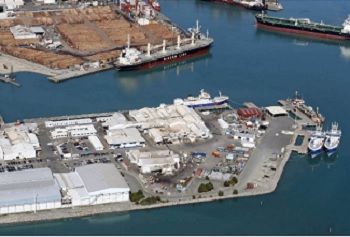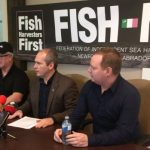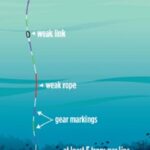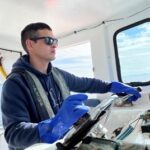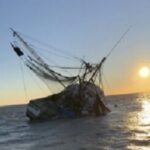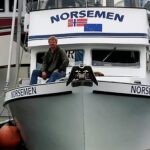Tag Archives: Coronavirus
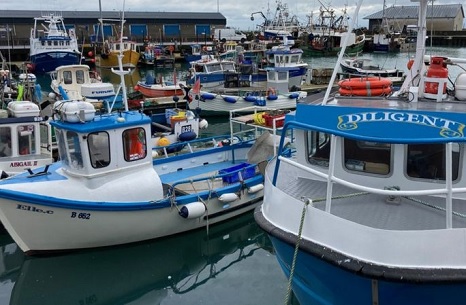
Coronavirus Tie-Up: NI Fishermen offered money to stop fishing
Northern Ireland’s fishing fleet is to be offered money to stop fishing as markets for its produce shrink due to Covid. A £1.7m pot is available to fishermen who wish to stop fishing for six weeks. They can apply to either of two “tie-up” periods between mid-October and the end of November. The closure of pubs, restaurants and workplaces across Europe has seen a big reduction in demand for full prawns and scampi – NI’s main exports. The cash will help will crew costs, mortgage payments on boats, insurance and harbour fees. >click to read< 10:35
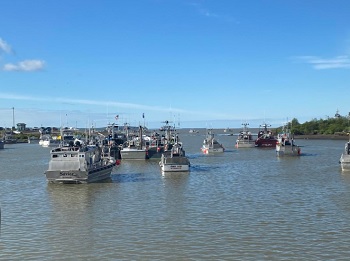
For Alaska’s seafood processors, the Coronavirus pandemic has cost tens of millions
Heading into the 2020 fishing season, many people were concerned that seafood workers from out of state would bring COVID-19 to rural communities. Processing companies managed to keep the disease under control. but at a big cost. Now, economists are looking at that financial toll. To keep track of how the pandemic is shaping the seafood industry, economists at the McDowell Group have started to publish monthly briefs for the Alaska Seafood Marketing Institute. “It’s interesting to describe a crisis when you’re in the crisis, right? And that’s our situation,” said Garrett Everidge, an economist at the McDowell Group. >click to read< 15:15
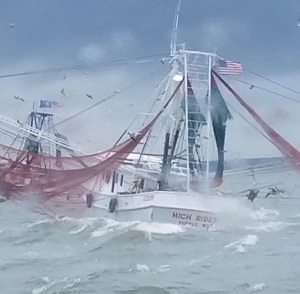
North Carolina shrimpers, fishermen concerned about mislabeled seafood
While brown shrimp, the most abundant of North Carolina’s shrimp landings, are typically harvested in the summer, now is the time for the whites, or green tails. “They are sweeter,” said Corey Galloway, with High Rider. “And when the water cools they are even better.” For Galloway, fall and winter weather improves a lot of local seafood. Breece Gahl of Fresh2U Seafood in Wrightsville Beach, for example, is looking forward to the wild oyster season, which begins Oct. 15. Until the pandemic, he often supplied seafood to restaurants. Earlier this year, Gahl switched to a “shore to door” delivery service and has been a regular at local farmers markets,, Pandemic related concerns aren’t at the forefront for this industry, though. Local shrimpers and fishermen are instead still being challenged by ongoing issues. >click to read< 07:35
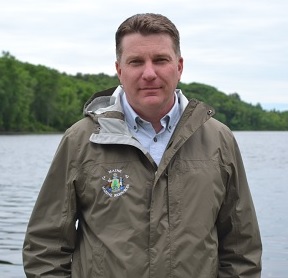
An Update from Commissioner Keliher
Dear Industry Member, I’m reaching to share what’s been happening recently at DMR. It’s been a busy summer. CARES Act – Negotiations with NOAA on our CARES Act spend plan have finally been completed.,, Soon, we will be reaching out to you by mail and email with information on the application process. USDA Trade Relief, Federal Whale Rules, Aquaculture, Marine Patrol, and more. Like I said, it’s been a busy summer. But, despite the ongoing challenges of Covid-19 we have established remote operations and the work continues. We will keep sending these updates until we can gather in-person. Until then, stay safe. Pat. >click to read< 12:21
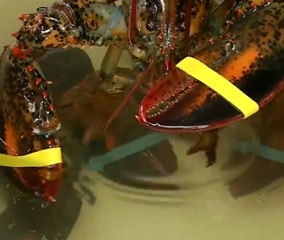
Maine lobster industry salvaged its summer despite pandemic
The Maine lobster industry is in the midst of a multiyear boom, and fishermen have caught more than 100 million pounds (45,360,000 kilograms) for a record nine years in a row. It’s hard to guess whether they’ll reach that total again, but summer 2020 hasn’t been half bad for a season in which many fishermen expected collapse, said Kristan Porter, president of the Maine Lobstermen’s Association. “Especially early in the season when nothing was open, no restaurants were open. We were thinking it would be a complete disaster,” Porter said. “If it stays like this, we can struggle through and have a season, and then get ready to fish next year.”>click to read< 17:03
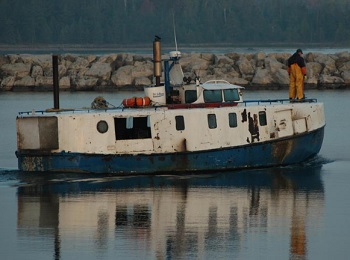
Congress gave $300 million to help fisheries. The Great Lakes got zero. Why were they left out?!
The nationwide shutdown was especially ill-timed for fishers in the Great Lakes. “We had reports of commercial fishermen in Michigan who had a catch with absolutely nowhere to sell it,” Luckily, there was a plan in place to help commercial fishers and charter boats. But when it came time to distribute that funding, most of the Great Lakes states were left out altogether. That came as a shock to many fishers. “Right up until the final hour, a lot of the Great Lakes fishery participants thought that they were going to be included,” says Gravelle. Why the Great Lakes were left out? >click to read< 14:53
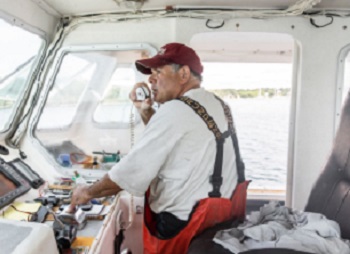
A Lobsterman Slogs On Through the Pandemic
Mike Dawson (self-employed) Location: New Harbor, Maine Employees: 1 Status: Open, essential industry. During the summer, “catch landings are probably down. But we can gain quite a lot in October, November, and December,” says Mike Dawson, a lobsterman who fishes off the coast of Maine. “August was kind of slow. Not an overabundance of lobster.” But Dawson this year is still grappling with the tepid demand and disruption caused by the pandemic. Lobster recently fetched $3.60 a pound for soft-shell, down from $4.05 a year ago. The occasional hard-shell lobster—which is rarer to catch at this point in the growing season for lobster—got $4 a pound, down about 25 cents a pound from a year ago. >click to read< 09:41
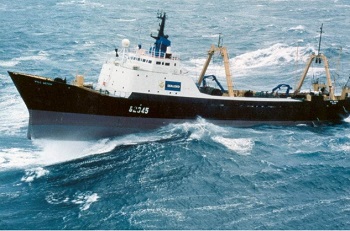
Second attempt to get Kiwi fishing crew home from Mauritius ready for take off
The crew of Sealord fishing vessel Will Watch have been unable to return to New Zealand due to Coronavirus, so the Nelson-based company has chartered private jets to finally enable a crew changeover after seven months’ fishing. After being scuppered by red tape and mechanical delays, fishing company Sealord’s second attempt to bring its crew home from Mauritius is set for take-off. >click to read< 18:53
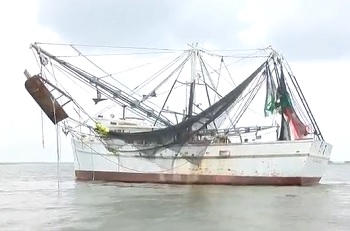
Georgia: Impacts of Coronavirus pandemic on selling shrimp
It’s been three months since the start of shrimp season. Back in June, a McIntosh County shrimp boat captain said his first catch could have been better. Shrimp boats hit the Georgia waters early in the morning Thursday. Darrell Gale said he’s had average catches, but when it comes time to selling the shrimp, that’s where he’s struggling. >video, click to read< 10:07
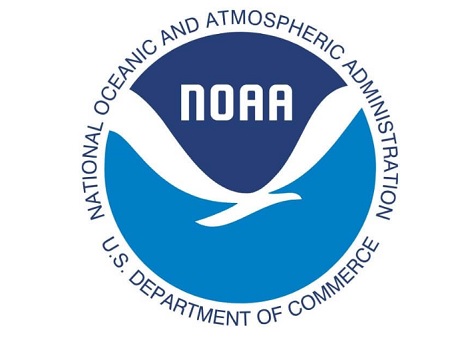
NOAA Fisheries Needs to Declare Fishery Disaster for Northeast Fisheries
NOAA Fisheries needs to declare a fishery disaster for the north Atlantic fisheries of the east coast due to complications caused by the Coronavirus pandemic. Due to government shutdowns of the primary market for US seafood, the restaurants, the fishing industry has been suffering not from a shortage of fish, but from a shortage of markets to sell them. 70% of the sea food consumed in the United States is sold in restaurants, the Corona pandemic has caused complete shutdowns of indoor dining in many states or reduced capacity seating in others. This has resulted in no demand for fresh local US caught fish, a very perishable product, and the resultant low prices that haven’t been seen in 50 years. By Jim Lovgren, >click to read< 07:38
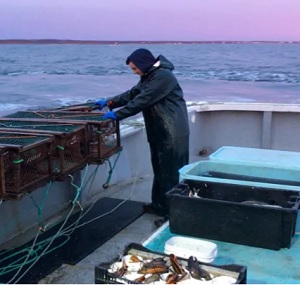
Prince Edward Island: New fishermen left out of Coronavirus support programs
The P.E.I. Fishermen’s Association is trying to get federal support programs for fishermen changed so people new to the industry can qualify. The association says these new fishermen don’t qualify for the Fish Harvester Benefit and Grant program, the Canada Emergency Business Account or the Canada Emergency Wage Subsidy. That’s because they need to supply information about their previous work in the industry. “There are several of the programs that require one or two years of previous financial information, which of course a new entrant would not possess,” said Ian MacPherson, executive director of the P.E.I. Fishermen’s Association. >click to read< 13:05
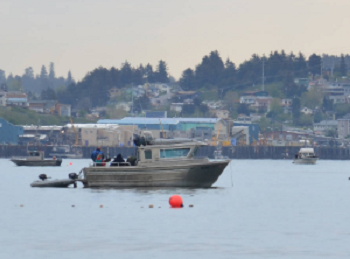
Bizarre salmon season winds down short of state projections
On top all the other effects of the coronavirus pandemic, it’s been a strange year for Alaska’s commercial salmon fisheries. As the fisheries are winding down, the total landings are about 17 percent behind the projections statewide. The Copper River sockeye run was a flop, as was the chum run statewide, and the silver salmon harvest was down everywhere except Kodiak and Bristol Bay. Prices were down, too, and processors had the extra expense and responsibility of keeping workers healthy in remote communities at close quarters. >click to read< 22:14
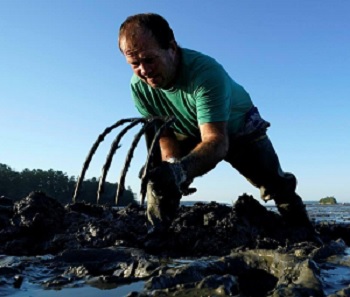
New England clam diggers press through the Coronavirus pandemic
The clamdiggers, who pull softshell clams for use in chowders and clambakes from tidal muck, have weathered an aging workforce, relentless predators that eat shellfish, warming waters and fickle markets. This summer’s pandemic has held back few of the clamdiggers from plying their trade in the coastal clam flats that have fed their customers for generations, members of the industry said. Buyers have rewarded the clammers with prices that have held up better than many sectors of the beleaguered seafood industry, which has suffered a significant economic hit from the pandemic. But some clammers said the disruption wrought by the pandemic has still created yet another difficulty to deal with. >click to read< 07:59
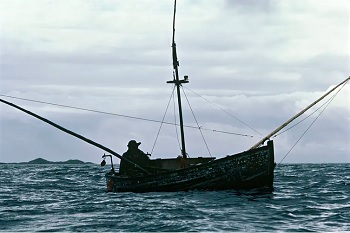
Evolving Business: Bristol Bay salmon fishery dealing with latest challenge, Coronavirus.
Wild salmon return from the ocean to restart a life cycle that has persisted for millions of years. Wild Alaska sockeye (a favorite species of salmon) is caught over the course of a four- to six-week season, from mid-June through July, when the largest remaining wild salmon population returns to Bristol Bay. But the fishermen, seafood processors and communities of Bristol Bay are under threat, and not for the first time. Bristol Bay carries painful memories of the 1918 Great Influenza, which devastated the local indigenous population. Now, the global economy has collapsed in the face of the COVID-19 pandemic, and the market for seafood, often eaten at restaurants, has collapsed along with it.,, And this happens at a time when farmed salmon is an ever-growing part of the industry. (In total conflict with this fishery) >click to read< 10:41

Fishermen, state leaders push back against at-sea monitoring proposal
The New England Fisheries Management Council (NEFMC) is considering Amendment 23 to the Northeast Multispecies Fishery Management Plan (FMP) that would require groundfishing vessels to implement 100% at-sea monitoring or a blended approach of at-sea monitoring and electronic monitoring. The proposed change seeks to improve catch accountability in the fishery, but fishermen argue this particular proposal is overly burdensome and unnecessary to achieve the stated goal,,, Overall, fishermen across Massachusetts fear this proposed policy would incur overly burdensome costs on an already struggling fleet, accelerating the expiration date of the fishery.” >click to read< 11:52
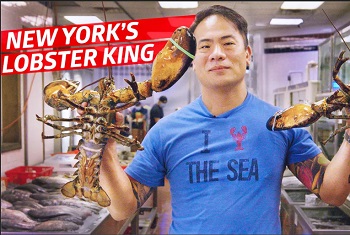
This Seafood ‘Sourcerer’ Runs New York City’s Lobster Game
“A lobster’s not just a lobster. A lobster is just like a diamond,” says Wong of the many different types of lobsters he sources from all over the country. Before COVID-19, the shop went through an average 60 to 80 thousand pounds of lobster per week, and during the holidays that number could be up to 150 thousand pounds. Wong’s company sells lobster and other fish to 175 restaurants in the northeast, and they ship anywhere in the world in under 24 hours; “even in Singapore,” he notes, “which has the longest flight, like 19 hours.” Eater followed Wong throughout his typical day. His first task, which begins around around 6:00 a.m., is to fulfill special fish orders for specific restaurants. At 9:00 a.m. he receives an order of fish from Fulton Fish Market,,, >click to read< 13:41
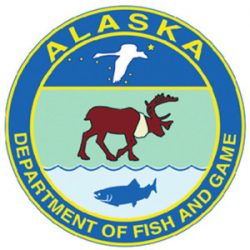
Coronavirus: Observer plans modified for commercial crab season
Observer deployment plans for the upcoming commercial crab season have been modified by the Alaska Department of Fish and Game in order to reduce risks of exposure to the COVID-19 virus, while still meeting minimum stock assessment data needs. ADF&G officials said that to accommodate revised deployment strategies, all vessels initially placed on the alternate selection list should be advised that they have a higher likelihood of being selected to carry an observer. Additional details on final observer deployment plans are to be provided by ADF&G,,, >click to read< 07:39
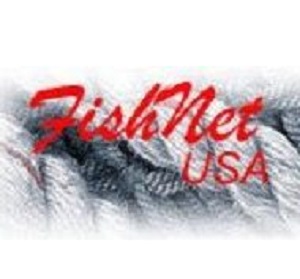
Nils E. Stolpe/FishnetUSA – NOAA Fisheries Coronavirus (COVID-19) Update
Well, first we have this reassuring (at least if you’re not that familiar with the capacity of NOAA Fisheries to get it really, really wrong!) statement that “NOAA Fisheries is actively monitoring and adjusting to the COVID-19 national health crisis”. Nothing to worry about, right? Well, not quite nothing. While I’ve seen nothing official, word on (at least some of the New Jersey) docks is that, in spite of the ongoing and very possibly worsening national Covid-19 health crisis, the mandatory on-board observers are back in force and demanding rides.,, It seems like just about anything that might involve NOAA/NMFS employee exposure to Covid-19 has either been cancelled or public participation has been severely restricted or eliminated. >Click to read<17:12
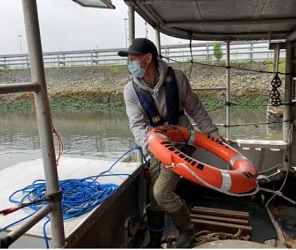
British Columbia – Crew Safety Training – Prepare And Protect your Crew from Coronavirus
WorkSafeBC and Transport Canada regulations set a high standard for training where emphasis is placed upon ensuring that both operational and emergency training occurs before work begins. In addition to this, COVID-19 has created new requirements for vessel owners and masters as they are now responsible for training crew on the vessel-specific protocols that are designed to protect the health of crew and the communities they interact with while fishing. >click to read< 13:45
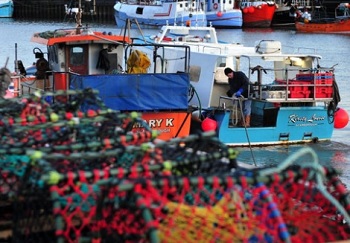
Seafish inviting Bridlington’s fishermen, vessel owners across UK to take to share impacts of Covid-19 in Fleet Survey
The UK fleet survey is asking questions about the financial and operational performance of fishing businesses. Questions on the impact of Covid-19 are also a major part of the survey this year. There will also be an opportunity for vessel owners to say how effective Government support measures have been for their businesses. Seafish is hoping vessel owners in Bridlington will fill in the form so it gets a better idea of the current situation. >click to read< , Fishing vessel owners asked to share impacts of Covid-19 in annual fleet survey – The fleet survey is usually undertaken by a team of researchers visiting hundreds of ports and harbours across the UK. Due to Covid-19 and challenges with travel and physical distancing, a different approach is being taken this year. >click to read< from Seafish, 15:43
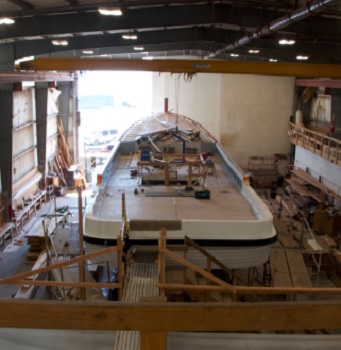
Despite Coronavirus pandemic, work continues on Western Flyer
Charged with leading the restoration efforts of the Western Flyer are of the Port Townsend Shipwrights Co-Op. Between the two are some 56 years of hands-on experience repairing, constructing, renovating and maintaining wooden boats. “This time last year, we were framing. There had been some structural work, some of the deck beams were put in, some of the longitudinal stringers, and some of the prep work for what was going to happen when we reframed, had been already done,” Lee said. Progress on the Western Flyer was chugging right along, Lee said, with consistent crews of eight to 10 staff working at any given time, now the project has been forced to drop down to about half its previous staffing. “With coronavirus we’re down to a crew of four, >click to read< 09:08
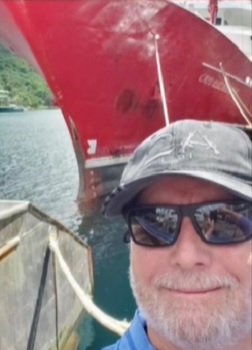
Commercial Tuna Fisherman Pete Battaglia and dozens of others working in the tuna industry are stuck in American Samoa
Battaglia is a long-time navigator in the tuna industry and runs U.S. boats out of American Samoa, which along with being a U.S. territory is also one of our country’s tuna hubs. While Battaglia and his crew were out at sea at the beginning of March, the COVID-19 pandemic led to new travel restrictions across the world. The fishermen returned to port to find customs agents in hazmat gear and commercial travel suspended to and from the island. Weeks have now turned into months and their family members fear their return could be well past Christmas. >click to read< 07:20
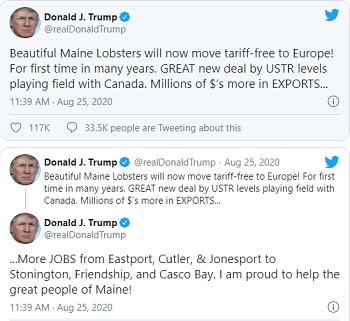
USDA trade aid for lobster industry using coronavirus coffers
The Trump administration is committed to starting an aid program to help the struggling lobster industry, Agriculture Secretary Sonny Perdue said Wednesday, but the funds to do so will come from the coronavirus stimulus package, not the aid used to bail out farmers after President Trump’s trade war with China. The lobster industry, like many others during the coronavirus outbreak, has seen losses as markets on cruise ships and restaurants evaporate.,, Trump has began paying considerable attention to Maine’s lobster industry starting this summer, traveling to Bangor in June to announce he would reverse protections for the Northeast Canyons and Seamounts Marine National Monument. >click to read< 18:07

A Fishery Observer Liability Form Letter to be signed by the observer before the observer accesses the Fishing Vessel
Thanks for your help in fighting the observer redeployment issue. I have just put together a Liability letter that every boat should print out and have onboard and make any observer sign before stepping foot on their vessel. I, _____________, in my capacity as a fishery observer, fully accept any and all legal consequences if in some way my actions and interactions cause the spread of the to the crew of the vessel in which I am deployed to. >Click to read, copy, reproduce, the letter, and have signed< Since NOAA and the observer companies are refusing to accept liability if any crewmen get sick from an observer, then we must put the onus on the observer himself. Thanks, Jim Lovgren 11:22
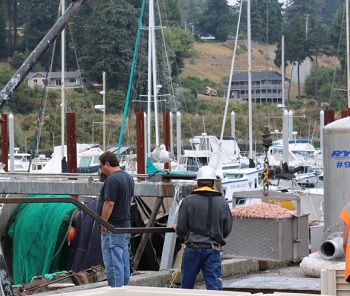
Coronavirus: Pacific Seafood reopens closed plant to process shrimp
The $9.6 million plant built by BC Fisheries LLC in 2016 closed earlier this year, leaving 30-some people without jobs and 15 local shrimp trawlers without convenient access to a buyer. But recently the Clackamas-based Pacific Seafood, which is one of the largest seafood companies in North America, took over the lease and reopened the plant to begin processing shrimp, at least for the remainder of the season. “Part of the mission of the Oregon Trawl Commission is to increase opportunities to ensure a sustainable and profitable trawl fishing industry,” Nowak said. “It’s in this spirit that we would like to recognize and thank the Port of Brookings, the state Department of Environmental Quality, Pacific Seafood and the State of Oregon for their efforts to ensure that 15 local shrimp trawlers have a buyer and processor here in our community.” >click to read< 07:27
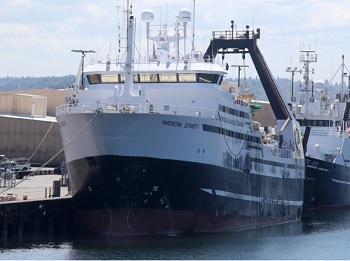
Seattle fishing boat outbreak suggests antibodies protect against coronavirus infection
Crew members from a Seattle-based fishing boat that experienced an explosive outbreak of the novel coronavirus have serendipitously provided what could be the first direct evidence that antibodies can protect people from reinfection. Blood samples collected before the vessel sailed in May showed that three of the 122 people aboard had robust levels of neutralizing antibodies, the type that block the virus from entering human cells, indicating they had been previously infected and recovered. All three were spared during the shipboard outbreak, which quickly spread to more than 85% of the crew. >click to read< 08:18
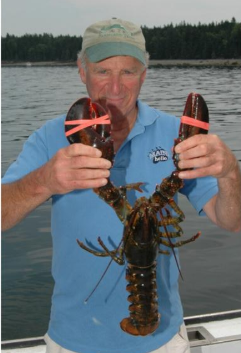
Lobster may lead to Coronavirus treatment
A Maine-based researcher and professor is optimistic a treatment for the global pandemic could be hiding in plain sight and Maine waters: in lobsters’ circulatory fluid, analogous to blood. That fluid, called hemolymph, is seen by most as trash — a throwaway byproduct that’s nothing more than production waste in lobster processing after they’re caught by fishermen. Lobsters’ hemolymph holds a protein that’s worked as an antiviral on herpes and shingles and may fight the coronavirus, Robert Bayer said. >click to read< 12:21
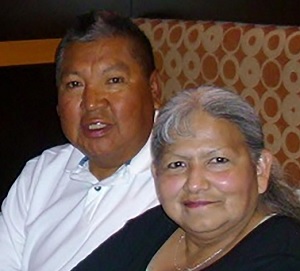
A community mourns loss of Yakama fisherman Simon Sampson and wife, Diane
With his wife by his side, Simon Sampson fought for his Yakama treaty hunting and fishing rights until he died on June 14. He was 71. Two weeks later, on June 28, his wife of 50 years, Diane Sampson, died from COVID-19 complications. She was 69. Their deaths have left somber clouds over their hometown of Toppenish on the Yakama reservation and along the Columbia River, where the Yakamas have fished since time immemorial. In town, the Sampsons were community activists working to improve public safety, education and good will to others. On the river, Sampson known as the Slammin Salmon Man, was a voice for tribal fishermen and their indigenous fishing rights preserved in the treaty. Sampson was fighting a federal conviction in the U.S. Court of Appeals of the Ninth Circuit when he died. >click to read< 10:30






